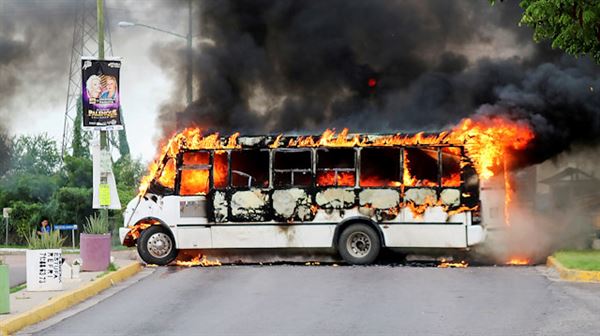In many communities throughout Mexico where crime organizations reign, locals have no choice but to turn a blind eye to their activities. And for many
In many communities throughout Mexico where crime organizations reign, locals have no choice but to turn a blind eye to their activities.
And for many years in places like Culiacan in Sinaloa state, the cartel has more or less left them at peace in exchange for this.
But that all changed on Oct. 17, when the Sinaloa Cartel took its fight to the streets, killing three civilians.
Many poor farmers in areas around Culiacan depend on the crime group for money. They farm opium and marijuana and the cartel pays them. But the relationship between the Sinaloa Cartel and civilians does not stop there.
When the government could not afford it, the cartel stepped in at times to foot the bill for roads, healthcare and churches. The Sinaloa Cartel worked to create a good relationship with the locals.
Mexican President Andres Manuel Lopez Obrador declared that the drug war was over since taking office in 2018; however, his comment was met with criticism as the homicide rate remains high.
As recently as September, Joaquin “El Chapo” Guzman, who for many years was the leader of the Sinaloa Cartel, continued this method, saying he wanted his wealth of over $12 billion to go to indigenous groups in Mexico. El Chapo is currently in prison in the United States for drug trafficking charges.
From his prison in Colorado, he has put forward the idea that not only his money but also all the wealth of other Mexican criminals in custody in the U.S. should be returned to their home country.
And in some poor regions of Mexico where the government has not sufficiently covered their needs, cartel groups’ financial investments in the communities can sway the locals’ mindset. In Culiacan, locals largely felt loyalty and a connection to the cartel for its alleged economic support of the community.
This is evident, for example, in the countless songs glorifying the work of Mexican cartels or the shrines erected in Sinaloa to drug lords after they die.
But the dynamic changed when Mexican government officials sent the army to capture the son of El Chapo in Culiacan in October. Gunmen for the Sinaloa Cartel flooded the streets, shooting randomly throughout the city, burning cars and blocking the city’s entrances.
Videos circulated on social media of the men armed with high-caliber weapons shooting into the air as locals fled into businesses and restaurants to take cover. The city looked like a warzone with smoke billowing in the air.
Due to the chaos that the cartel created, the Mexican government decided to release the son back to the organized crime group in order to bring peace to the city.
The locals were shaken. Their city was ground zero for the battle between the government and the cartels. Many civilians felt that the incident was a betrayal of the relationship they had beforehand.
In addition, other recent events reportedly caused by cartel organizations – like the murder of nine members of a U.S.-Mexican family on Monday in northern Mexico – are prompting locals to feel even more uneasy about their situation, according to Guadalupe Correa-Cabrera, who studies criminal organizations at George Mason University in the U.S. state of Virginia.
“The fact is that they feel that they’re not safe,” Correa-Cabrera said. “It’s getting into their homes. It’s killing their kids and their women.”
But the question remains whether the relationship between the cartel groups and locals can ever really change. At the end of the day, the criminal groups have a stronghold over many regions of Mexico.
Locals look at Sinaloa and other similar tragedies as examples that the government truly is weaker than the criminal organizations in Mexico.
“People are without any hope because the state…alleges that it doesn’t have the capacity to deal with these organizations,” Correa-Cabrera said. “They have so much power. How can the society defend themselves from this?”
Shortly after the shootouts in Sinaloa and the release of El Chapo’s son, videos spread on social media of the newest ballad lauding the kingpin. The song begins with the lyrics “Culiacan converted into a warzone.”
